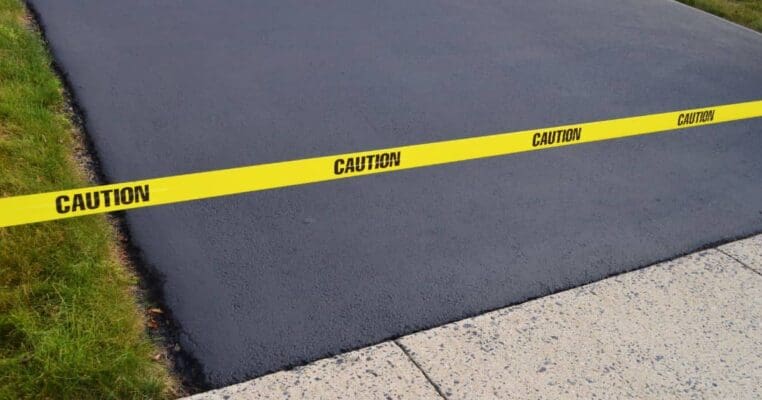Installing a new asphalt driveway or pavement can provide many benefits, but it also comes with a few challenges. The process can be unclear and confusing, from not knowing when to drive on it to not knowing how long to park your car. Read on to discover the asphalt curing process and how to protect your new asphalt driveway while maintaining its quality.
Asphalt Curing Duration
A new asphalt driveway or pavement takes up to 5 days to dry and needs six to 12 months to cure fully. When asphalt completely cures, it transforms into a stable, solid, and cohesive mass, unlike when dried. As it cures, it slowly changes color from black to dark gray because of the release of gases that interact with sunlight. Excess oils and volatiles evaporate during this process, leaving a firm surface that can withstand traffic.
Several factors affect the asphalt curing process. These include temperature, air movement, and humidity.
Temperature affects the oil and soil content release of volatiles in asphalt. As temperatures drop, asphalt takes longer to dry and cure. In addition, when the temperature is too high, the pavement may dry faster than the oils, creating a soft surface that damages the asphalt surface.
Secondly, air movement, such as wind, affects the timeline of the asphalt curing process. When it’s windy, asphalt dries faster because the wind can dry particles on the surface of the asphalt. On a calm day, however, asphalt doesn’t dry as fast because it does not get good air circulation.
Humid conditions, on the other hand, prevent asphalt from drying quickly, delaying the curing process. Additionally, using asphalt with low moisture content is more appropriate because it will be able to dry faster.
Although the curing process takes longer, you can use your newly installed asphalt pavement at least three days after its installation. You should, however, take certain precautions to preserve its quality and ensure it remains in good condition for a long time. Some of the protection plans that you should consider include the following:
Park in Different Spots Before the Pavement Fully Cures
Regularly parking in a single spot can create a depression on your new asphalt driveway or pavement. When a vehicle weighing up to 10,000 pounds sits on the exact spot of a new driveway or pavement, it leaves an imprint, causing the asphalt to wear and tear.
To prevent this from happening, park in different spots before your new pavement fully dries out or cures. You can also consider parking on wooden blocks to protect your driveway and the rest of the asphalt from damage.
Fix Cracks and Holes Immediately
Newly installed asphalt is weak, making it unable to withstand traffic or daily wear and tear. Therefore, ensure you give it time to dry completely before parking your vehicles on the driveway. However, if you notice cracks or other defects in your new asphalt pavement in West Palm Beach, you should immediately have them fixed by a qualified contractor. You can schedule driveway paving services from Sunshine Services Unlimited, Inc. to help you fix minor driveway defects like potholes and cracks and protect your new asphalt driveway while it cures and even after.
Avoid Liquid Spills or Leaks
Fluids like gasoline can cause damage to asphalt. If you spill these liquids on your driveway, clean them up immediately. If the asphalt starts to soften or crack after the spills, your driveway’s curing process will be negatively affected.
Conclusion
Hopefully, these tips will help you maintain your driveway’s quality, durability, and beauty. Contact Sunshine Services Unlimited, Inc. today if you need quality asphalt restoration and driveway paving services in West Palm Beach and surrounding areas.

